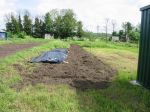Categories
Calendars
Guides
Reviews
Archive
Gallery
Articles
Ask Our Gardening Expert
WHAT AND HOW TO MULCH
PLANTS
(page 2)
Inorganic Mulches
Inorganic mulches are normally black plastic, woven
black plastic, fibre fleece, grit or pebbles. Each is suitable for
different reasons and uses. Inorganic mulches are great for retaining water and for
killing and stopping the growth of weeds. If you want to improve your soil at the same time, this
must be done before laying down inorganic mulches. The cheapest form of inorganic mulch is black plastic.
This is only useful if the ground is flat and free of pebbles because
black plastic tears easier than other mulches. It's not attractive
either and needs to be held down well. Once used for a season it's
unlikely to be in a fit state to be used again. It is very good at
retaining moisture and will kill most weeds and prevent them from
reappearing. Woven Black Plastic is similar to black plastic but is
much stronger and can be re-used for several years. It is however more
expensive compared to black plastic. Fibre fleece almost floats on the surface of soil and
plants. It keeps in the warmth and excludes pests. It is not so good at
retaining moisture or killing weeds. Grit and pebbles are frequently used because they are
attractive and permanent. The are reasonably good at retaining moisture
and preventing weeds. Coarse grit will deter slugs to a great degree.
To use the black plastics, simply cut them to size and
lay them on the soil. They need to be securely anchored down with
stones, bricks or soil to prevent them blowing away in strong winds. As
with any mulch, make sure the soil is well-watered before you apply the
mulch. To lay pebbles or grit, simply pour them on the ground
to a depth of about 5cm (2in). They can then be levelled off with a rake
or a spade.
 To use the black plastics, simply cut them to size
and lay them on the soil. They need to be securely anchored down
with stones, bricks or soil to prevent them blowing away in strong
winds. As with any mulch, make sure the soil is well-watered before
you apply the mulch. Click the picture on the left to see plastic
laid on a newly dug allotment.
To use the black plastics, simply cut them to size
and lay them on the soil. They need to be securely anchored down
with stones, bricks or soil to prevent them blowing away in strong
winds. As with any mulch, make sure the soil is well-watered before
you apply the mulch. Click the picture on the left to see plastic
laid on a newly dug allotment.